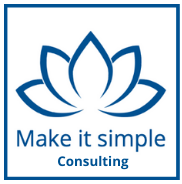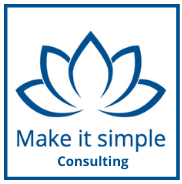Agile workshops
In uncertain and complex that is unpredictable situations we know that the performance of a team depends on its ability to cooperate and maintain good interactions to produce efficiently.
- We define agility as the ability to react and act with an open state of mind to internal or external transformation, or the ability to act quickly and efficiently in uncertain environments.
- Acting in an Agile manner is above all about systematically creating value for customers, employees and the company, with a specific mindset and using specific processes and tools, at the service of people and collective intelligence.
- Becoming agile means above all practicing agile working methods.
Make it Simple Consulting® can very quickly create value for your Business and a new way of working within teams by removing silos, accelerating problem solving and innovation as well as developing collective intelligence and entrepreneurship.
A methodology that allows Managers and teams to easily and very quickly:
- Face the UNKNOWN,
- Strengthen COLLABORATION,
- Accelerate INNOVATION,
- Maximize PRODUCTIVITY
- Promote CONNECTIVITY
Make it Simple Consulting® has developed a specific approach to Agility, based on a methodology, processes and tools that allow the implementation of an Agile business mindset and management.
It is an approach to Agility that has proven itself in many Business sectors and facing different challenges and can be acquired either through Training Programs or through the Team Workshops.
Agile Workshops are on-the-job development that allows you to acquire the mindset, tools and Agile methodologies by working directly on the challenges of the team and the company.
Workshops are carried out during operational team times or during dedicated times in order to:
- Strengthen collaboration,
- Accelerate creativity and innovation,
- Maximize productivity
- And promote connectivity within the team
This approach, which can be managed in half a day, allows an operational and rapid discovery of Agility and its impact on team efficiency.
Five types of workshops can be implemented:
- Problem Mapping
People have been trained since youth to resolve problems by jumping right away into finding solutions without trying to know or understand what the problems we are asked to solve. Many times, « the solution is the problem »!
Many times, we project ourselves into the future to immediately find solutions without really questioning what is the problem, in which way is it a problem (what are the impacts of this problem) and for whom is it a problem!
In 30 minutes, with the Problem Mapping Process we will make sure the team deals with the real problem or problems and we will focus “here” and “now”.
- Opportunity Mapping
The way we have been educated to Problem Solve drives the way we work with opportunities. With the Opportunity Mapping Process we ensure the Team explores the full potential of the situation and is able to rapidly identify Key Success Indicators (KSI)
- Co-creation
It is about moving from Problem Mapping to Problem Solving in a very disruptive way. Starting to use “How” instead of “Why”.
Sometimes, because of the complexity of a situation, we have no idea about how to solve a problem. The Co-Creation Process activates collective intelligence and makes the teams identify Solution Intents in 30 minutes.
- Co-Development
Sometimes, we have an idea to solve a problem but are not ready to make a decision and need to receive feedback and proposals for improvement.
The Co-Development Process activates teams’ collective intelligence to enrich an idea, in a very structured way and in a very efficient and quick manner (30 to 45 minutes).
- Co-Decision
Very often we are lost in the decision-making process and confuse clarification questions, opinions and objections and we end-up debating and over thinking, the decision-making process.
With the Co-Decision process we protect crucial decisions from “political games”.
It does support expression from all without debate and focuses on any impact that may arise from implementing the decision. It is a time-saving tool that helps team alignment without seeking consensus, compromise or full agreement.



